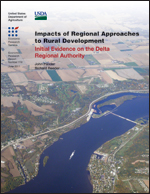Impacts of Regional Approaches to Rural Development: Initial Evidence on the Delta Regional Authority
- by John Pender and Richard Reeder
- 6/23/2011
Overview
The Delta Regional Authority (DRA) began funding rural development projects in economically distressed counties in the Mississippi River Delta region in 2002. To assess the initial economic outcomes of DRA funding, we compared nonmetropolitan DRA counties with similar counties elsewhere in the same region as well as in the Southeast. Per capita income, net earnings, and transfer payments grew more rapidly in DRA counties than in similar non-DRA counties, and those impacts were stronger in counties in which DRA spending was higher. Each additional dollar of DRA spending was associated with an increase of $15 in the growth of annual personal income from 2002 to 2007, including an increase of $8 in annual earnings (primarily in the health care and social services sector) and an additional $5 in annual transfer (Government) payments (mainly due to increased medical transfer payments such as Medicare and Medicaid). Our findings suggest that investments supported by the DRA in improved medical facilities and DRA efforts to increase the supply of health professionals may be promoting additional health sector earnings and medical transfer payments.
Download
-
Entire report
Download PDF -
Report summary
Download PDF -
Download ERR119.zip
Download ZIP

